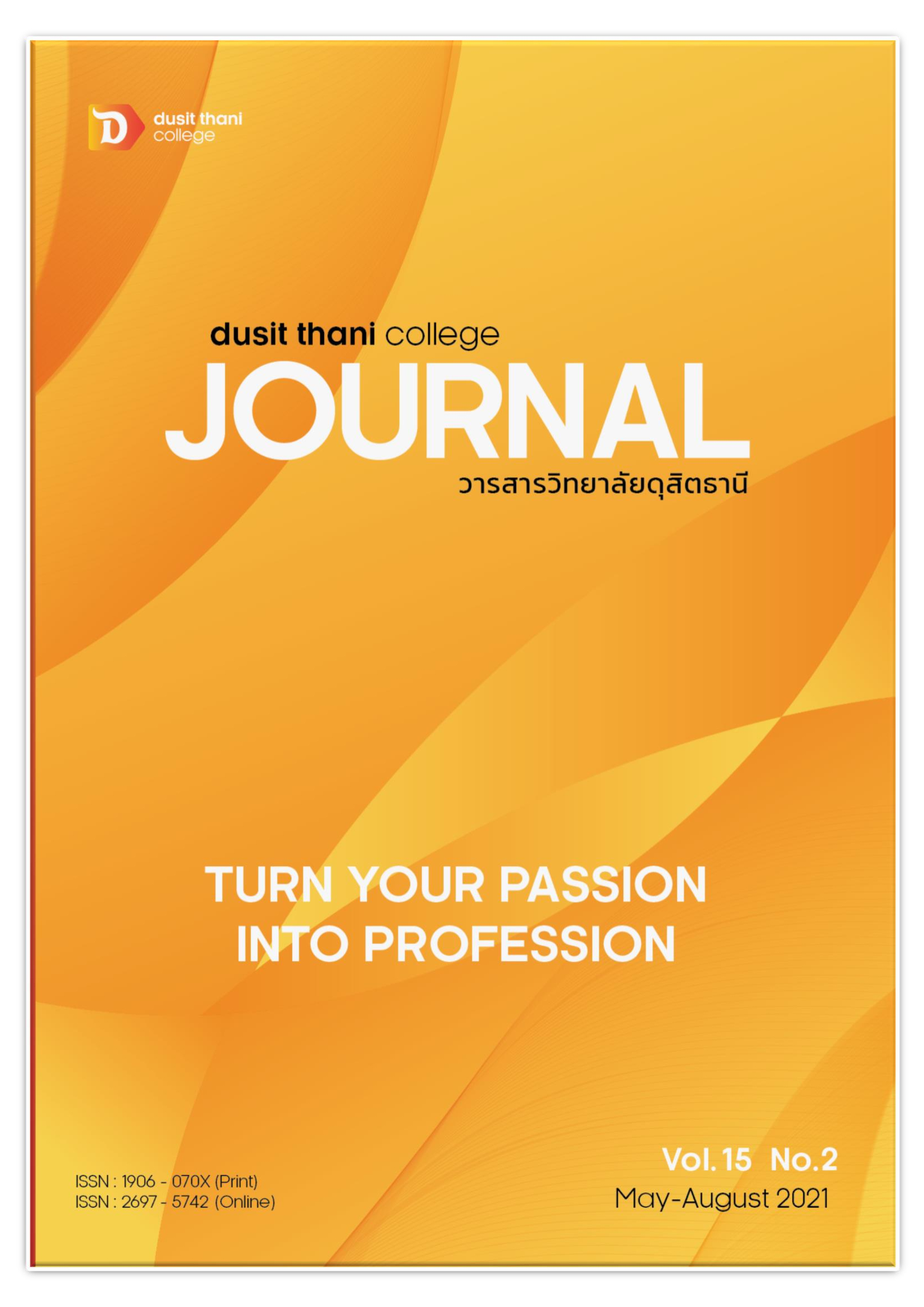GREEN RESTAURANT MANAGEMENT STRATEGY OF VIEW RESTAURANT ENTREPRENEUR BROCCOLI REVOLUTION, BANGKOK
Main Article Content
Abstract
The objective of this research is to study the environmental friendly restaurant strategies from the perspective of Broccoli Revolution restaurateur in Bangkok. This study is conducted by applying qualitative research methods by interviewing the key informants who entrepreneurs of Broccoli Revolution, Bangkok with specific select and using content analysis method. The research findings are as follows: 1) The benefit of recycling which is the principle
concept of the restaurant, focusing on cancellation of all single-use materials. The management aims to use recycle, reuse and upcycle concepts with all products in the restaurant as well as ally with others related businesses to promote recycle, reuse and upcycle concepts. 2) Energy and environmental management; in general the restaurant has the high rate of power consumption, therefore, this restaurant is tend to be decorated by transparent glass in order to have the natural light which could reduce the power consumption rate during daytime. 3) Environmental friendly service and support by building and training the understanding of environment to staff and sharing the environmental friendly perception to customers. 4) Sustainable food; this is the plant based vegan restaurant where all dishes have its own distinctive signature, therefore, there will not contain animal products and use non-toxic (organic) products Health, Society and Environment are 3 important components of the restaurant environmental friendly strategy and by applying this strategy to downstream, midstream and upstream will lead to the sustainable business.
Article Details
Article Screening Policy
- All research and academic articles to be published must be considered and screened by three peer reviews in the relevant field / article.
- All articles, texts, illustrations and tables published in the journal are the personal opinions of the authors. Editors don't always have to agree. And no responsibility whatsoever is the sole responsibility of the author.
- The articles to be published must never be published. Where did you first publish? And not in the consideration of other journals If the audit found that there has been a duplicate publication It is the sole responsibility of the author.
- Any article that the reader sees as being plagiarized or impersonated without reference. Or mislead the work of the author Please let the journal editor know it will be your greatest blessing.
References
Friendly Business Operation. Valaya Alongkorn Review (Humanities and Social Science), 7 (2), 131-141.
Department of Environmental Quality Promotion, Ministry of Natural Resources and
Environment. (2019). Example Restaurant Success and Green Restaurant. Bangkok: Department of Environmental Quality Promotion, Ministry of Natural Resources and Environment.
Jeong, E. and Jang, S. (2010). Effects of restaurant green practices: Which
practices are important and effective?. Hospitality Research Caesars Hospitality Research Summit, University of Nevada, Las Vegas.
Kanchanapamornpat, T. (2019). Management of Environmental Friendly Hotel in
Southwestern Thailand. Doctor of Philosophy (Management) Graduate
School, Siam University.
Khumkaew, P. (2016). Factors Positively Affecting Behavioral Intentions of Consuming
Healthy Food of Consumers in Bangkok. M.B.A., Graduate School, Bangkok University.
National Restaurant Association. (2018). The State of Restaurant Sustainability
2018. National Restaurant Association, National Restaurant Association Educational Foundation and Council of State Restaurant Associations
Office of the National Economic and Social Development Board. (2017). The Twelfth
National Economic and Social Development Plan (2017-2021). Bangkok: Office of the National Economic and Social Development Board.
Podhisita, C. (2016). Science and Art of Qualitative Research. Nakhon Pathom: Institute
for Population and Social Research Mahidol University.
Shen, Y.P. (2017). Consumption Intentions toward green restaurants: Application of theory
of planned behavior and altruism. International Journal of Management, Economics and Social Sciences (IJMESS), 6(3).
Srisaard, B. (2010). Basic Research. Bangkok: Suweeriyasan.
Suwandacha, A. (2016). Recognition of ASEAN Tourists Affects their Willingness to
go to Green Restaurant in Pattaya. Business Administration Program in Global Business Management, Graduate School of Commerce, Burapha University.
Sweeneya Jillian C., Soutar Geoffrey N. (2001). Consumer Perceived Value: The
Development of a Multiple Item Scale. Journal of Retailing, 77, 203–220.
Weerasamrit, W. (2010). Corporate social responsibility influencing the loyalty of
Advance info service public company’s customers. Master’s Project, M.B.A.
(Marketing). Bangkok: Graduate School, Srinakharinwirot University.
Woolf, S.H., and Aron, L. (2013). US health in international perspective: Shorter
lives, poorer health. New York: National Academies.


